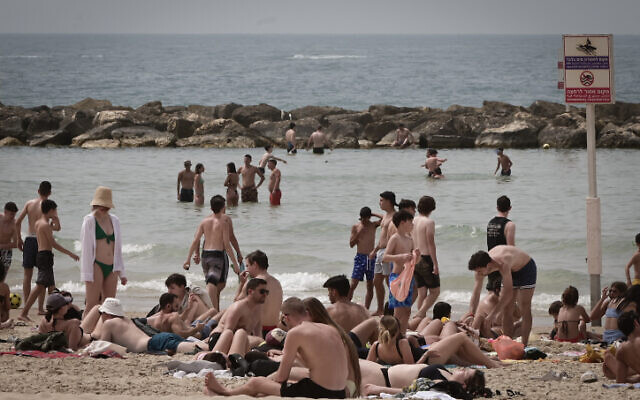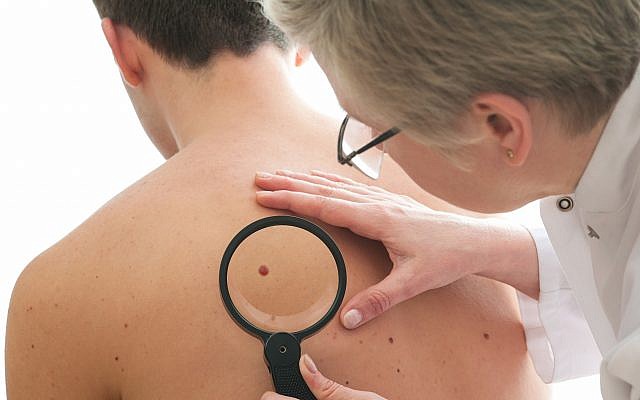In sizzling Israel, Skin Cancer Awareness Week shines light on safety in the sun
With melanoma cases on the rise, Israelis are urged to schedule free dermatology checks, take precautions, and protect children and youth under 18
Renee Ghert-Zand is a reporter and feature writer for The Times of Israel.

The Israeli summer has arrived. Temperatures are heating up, the sun is beating down, and Israeli health authorities are warning citizens to take precautions against skin damage.
Israel’s 31st annual Skin Cancer Awareness and Early Detection Week is a public health campaign led by the Israel Cancer Association (ICA), in cooperation with the country’s four HMOs. It runs from June 6 – 18.
The week is organized around a campaign encouraging Israelis to schedule free skin check exams with a dermatologist or plastic surgeon through their HMO.
“This is a great opportunity to have any new or old moles, spots, or birthmarks checked for changes. However, people should make an appointment at any time during the year to have any difference in shape, color, texture, or sensation — such as itching — of a mole checked,” ICA health promotion specialist Dana Frost told The Times of Israel.
“An annual whole-body skin check is recommended for everyone. The key to saving lives is early detection,” she added.
According to data supplied by the ICA, Israel is currently ranked 22nd among the 30 countries with the highest melanoma rates. In the early 1990s, when ICA started ramping up its skin cancer prevention education efforts, Israel placed an alarming third after Australia and New Zealand.
Melanoma accounts for only one percent of skin cancers, but it is the most aggressive form. Melanoma can metastasize to the brain, bones, lungs, and liver. Treatment for metastatic melanoma can include surgery, immunotherapy, targeted therapy, and chemotherapy.
The other three main types of skin cancer are basal cell carcinoma, squamous cell carcinoma, and Merkel cell carcinoma.
Around 2,000 new cases of malignant melanoma were diagnosed in Israel in 2022 — 60% of them in men and 40% in women, up from 1,818 cases in 2019 and 1,634 in 2013, according to Health Ministry statistics. It is estimated that 10,000 people in Israel are recovering or have recovered from melanoma.
“Every day in Israel, five people are diagnosed with malignant skin melanoma. But fortunately, thanks to awareness and vigilance, around 90% of these cases are detected very early, which is crucial for chances of a full recovery,” noted ICA director-general Moshe Bar-Haim in a statement.

Although everyone must be careful, people with light skin, eyes, and hair are most at risk from the sun’s rays. Individuals who suffered sunburns in their youth are more likely to develop skin cancer later in life. Some medications can make a person’s skin more sensitive to the sun, so it is a good idea to consult with one’s doctor or pharmacist.
According to Frost, prevention is as crucial as early detection.
“We need to be realistic about the fact that Israel has more than 300 days of sun per year, we are located on the edge of a desert, and we experience very strong sun radiation,” Frost said.
She emphasized that parents should protect their children and teenagers from sun exposure, as 80% of skin damage from the sun’s rays occurs under the age of 18.
For this reason, many of the ICA’s social media and TV public service announcements target young adults, teens, and parents.
“It may not be noticeable until later on, but once the damage has been done early in life, it has been done. This is why we even bring our educational materials to nursery school teachers, so that they know how to protect their students from the sun, and they can teach the children how to protect themselves,” Frost said.
Dr. Hana Hajj Abaya, a dermatologist at Rambam Medical Center, pointed out that although melanoma is rare among youngsters, there has been an increase in diagnoses in Israel and around the world.
“We are attributing this worrisome development to the use of tanning beds,” she noted in a statement from the hospital.
Abaya also warned that sunbathing to increase one’s Vitamin D levels is not recommended anymore.
“Most of us in Israel get enough sun exposure to make enough Vitamin D. If for any reason our levels are lower than they should be, it is better to take Vitamin D supplements or eat foods rich in Vitamin D,” she said.
According to Frost, the best way to prevent sun exposure is to not go outside between 10 am and 4 pm.
“And if you must, then wear a hat, sunglasses, and clothes that cover exposed skin,” she said. “Also, use sunscreen with 30 SPF or higher and reapply it if you are outside for more than two to three hours.”









